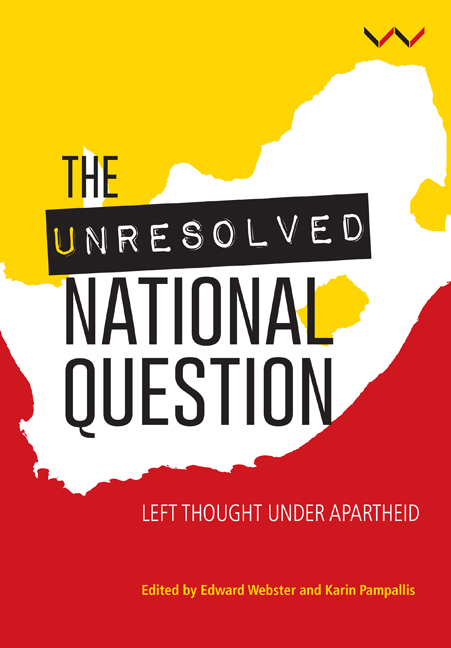Book contents
- Frontmatter
- Contents
- Acronyms and Abbreviations
- Preface: Edward Webster and Karin Pampallis
- Introduction: Revisiting the National Question
- PART ONE KEY FOUNDATIONAL TRADITIONS
- PART TWO CONTINUITY AND RUPTURE
- Chapter 6 Vicissitudes of the National Question: Afrikaner Style
- Chapter 7 Neville Alexander and the National Question
- Chapter 8 The Marxist Workers’ Tendency of the African National Congress
- Chapter 9 The National Question confronts the Ethnic Question
- Chapter 10 Variations on a Zulu Theme
- Chapter 11 Black Consciousness as Nationalism of a Special Type
- Chapter 12 Postponing the National Question: Feminism and the Women's Movement
- Chapter 13 Workerists and the National Question
- Chapter 14 Red, Black and Gold: FOSATU, South African ‘Workerism’, Syndicalism and the Nation
- Chapter 15 National Democratic Revolution meets Constitutional Democracy
- Biographical Notes
- Index
Chapter 11 - Black Consciousness as Nationalism of a Special Type
from PART TWO - CONTINUITY AND RUPTURE
Published online by Cambridge University Press: 21 April 2018
- Frontmatter
- Contents
- Acronyms and Abbreviations
- Preface: Edward Webster and Karin Pampallis
- Introduction: Revisiting the National Question
- PART ONE KEY FOUNDATIONAL TRADITIONS
- PART TWO CONTINUITY AND RUPTURE
- Chapter 6 Vicissitudes of the National Question: Afrikaner Style
- Chapter 7 Neville Alexander and the National Question
- Chapter 8 The Marxist Workers’ Tendency of the African National Congress
- Chapter 9 The National Question confronts the Ethnic Question
- Chapter 10 Variations on a Zulu Theme
- Chapter 11 Black Consciousness as Nationalism of a Special Type
- Chapter 12 Postponing the National Question: Feminism and the Women's Movement
- Chapter 13 Workerists and the National Question
- Chapter 14 Red, Black and Gold: FOSATU, South African ‘Workerism’, Syndicalism and the Nation
- Chapter 15 National Democratic Revolution meets Constitutional Democracy
- Biographical Notes
- Index
Summary
THE NATIONAL QUESTION: SOME EPISTEMOLOGICAL CONSIDERATIONS
Even though this chapter is primarily an exposition of the black consciousness approach to the National Question, it is ultimately an exploration of what an alternative conception of this question might have been outside of its dominant framing within twentieth-century Marxism. This conceptual re-framing is in the spirit of the Rhodes Must Fall campaign that started at the University of Cape Town on 9 March 2015. After concerted mobilisation – and resistance – the students succeeded in having the university agree to the removal of the statue of Cecil John Rhodes. The statue came down exactly a month later, on 9 April 2015. Central to the demands of the students was a call for all inherited and accepted knowledge systems – including Marxism, non-racialism and black consciousness – to be the subject of renewed critique from the perspectives of black people, and black women in particular.
In the ensuing debates, students and staff have questioned the scientific rationality that informs both liberal and Marxist epistemologies. This rationalist epistemology, Kwame Anthony Appiah (2005) argues, can be divided into two categories. On the one hand is the hard rationalism that refuses to entertain anything that has no foundation in scientific fact. Opponents of the Rhodes Must Fall movement dismissed it as too focused on pain and emotion. And because race does not have such scientific validity, they have been insisting that it should be barred from political discourse.
Isaiah Berlin (2000: 22) pointed out that this argument harkened to the Enlightenment idea that solutions to social problems will be obtained ‘by the correct use of reason’. The logic is that ‘there is no reason why such answers, which after all have produced triumphant results in the worlds of physics and chemistry, should not apply to the equally troubled fields of politics, ethics and aesthetics’ (Berlin, 2000: 22). But Appiah also describes an alternative way of thinking about the world, and about race in particular, which he calls ‘soft rationalism’. This allows for the fact that identities are ‘unlikely to be settled by uncontroversially factual considerations’ (Appiah, 2005: 178). Or as Patrick Chabal (2012: 33) puts it, the ‘inability to conceive of other beliefs, other rationalities, confines our abilities to make sense of what we observe’.
- Type
- Chapter
- Information
- The Unresolved National Question in South AfricaLeft Thought Under Apartheid, pp. 199 - 216Publisher: Wits University PressPrint publication year: 2017



